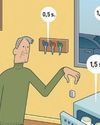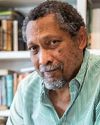
Now it was 2017-a year since he had been in a trial at the National Hospital for Neurology and Neurosurgery in London. Researchers were testing whether a drug approved to treat type 2 diabetes could also ease Parkinson's symptoms. Wharrad received a daily dose of either the drug or a placebo, but he didn't know which.
During the trial, Wharrad had thrived. His joints ached less, and he could get up from a chair more easily and take walks around the block. Friends and family commented on his obvious improvement. And his score on a Parkinson's assessment tool improved significantly. "My wife and I were convinced I was taking the drug," says Wharrad.
But at his end-of-trial meeting with one of the researchers-who also didn't know whether Wharrad had been on the drug or not-he got a surprise. When he opened the envelope to find out what he'd been taking, he read the word "placebo."
Wharrad's reaction was disbelief. "I was speechless," he says. "I had been feeling so much better."
How Placebos Work
A PLACEBO CAN be a sugar pill, a saline injection, or a glass of coloured water: inert treatments that shouldn't produce a physiological response. But often they do; Wharrad's case is not unusual. In fact, placebos are increasingly proving to be more powerful than active drugs in trials and they may just be the key to reducing our dependence on medications.
The so-called placebo effect happens when the brain convinces the body that a fake treatment is authentic, which stimulates relief. Doctors have known of it for centuries, but in the past 50 years, neurologists have uncovered the molecular mechanisms and pathways at play when a sham treatment creates real healing.
Bu hikaye Reader's Digest UK dergisinin September 2022 sayısından alınmıştır.
Start your 7-day Magzter GOLD free trial to access thousands of curated premium stories, and 9,000+ magazines and newspapers.
Already a subscriber ? Giriş Yap
Bu hikaye Reader's Digest UK dergisinin September 2022 sayısından alınmıştır.
Start your 7-day Magzter GOLD free trial to access thousands of curated premium stories, and 9,000+ magazines and newspapers.
Already a subscriber? Giriş Yap

EVERY SECOND COUNTS: TIPS TO WIN THE RACE AGAINST TIME
Do you want to save 1.5 seconds every day of your life? According to the dishwasher expert at the consumer organisation Choice, there’s no need to insert the dishwashing tablet into the compartment inside the door.

May Fiction
An escaped slave's perspective renews Huckleberry Finn and the seconds tick down to nuclear Armageddon in Miriam Sallon’s top literary picks this month

Wine Not
In a time of warning studies about alcohol consumption, Paola Westbeek looks at non-alcoholic wines, how they taste and if they pair with food

Train Booking Hacks
With the cost of train travel seemingly always rising, Andy Webb gives some tips to save on ticket prices

JOURNEY TO SALTEN, NORWAY, UNDER THE MIDNIGHT SUN
Here, far from the crowds, in opal clarity, from May to September, the sun knows no rest. As soon as it’s about to set, it rises again

My Britain: Cheltenham
A YEAR IN CHELTENHAM sees a jazz festival, a science festival, a classical music festival and a literature festival. Few towns with 120,000 residents can boast such a huge cultural output!

GET A GREEN(ER) THUMB
Whether you love digging in the dirt, planting seeds and reaping the bounty that bursts forth, or find the whole idea of gardening intimidating, this spring offers the promise of a fresh start.

Under The GRANDFLUENCE Suzi Grant
After working in TV and radio as an author and nutritionist, Suzi Grant started a blog alternativeageing.net) and an Instagram account alternativeageing). She talks to Ian Chaddock about positive ageing”

Sam Quek: If I Ruled The World
Sam Quek MBE is an Olympic gold medalwinning hockey player, team captain on A Question of Sport and host of podcast series Amazing Starts Here

Stand Tall, Ladies
Shorter men may be having their moment, but where are the tall women?